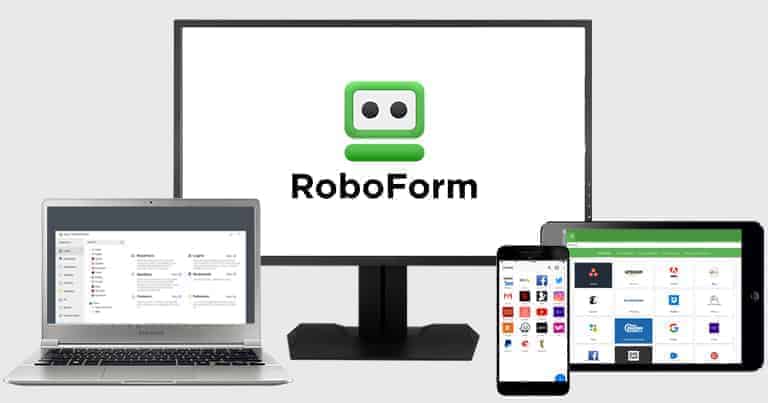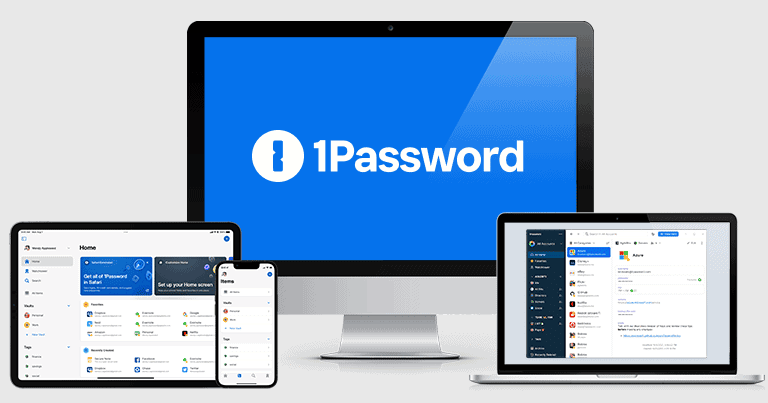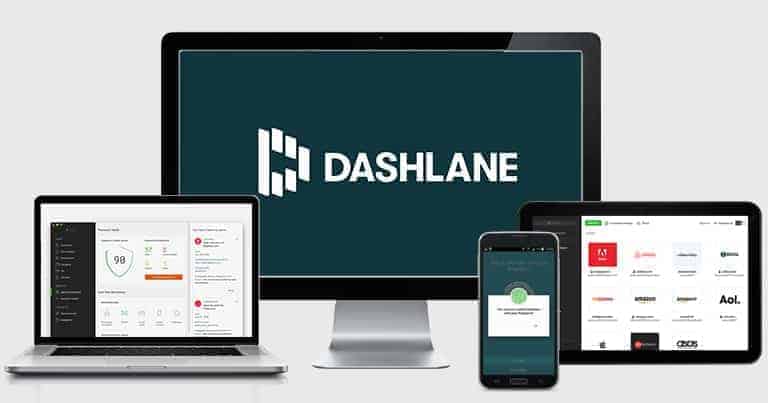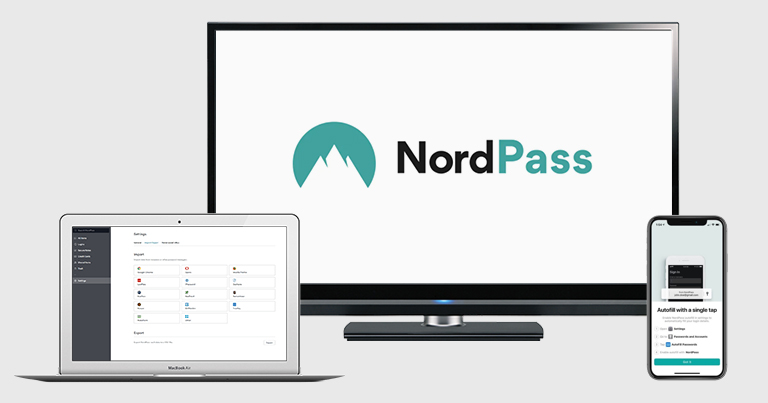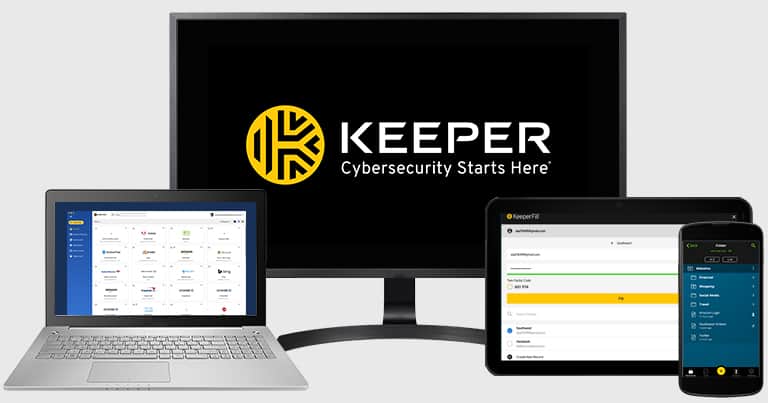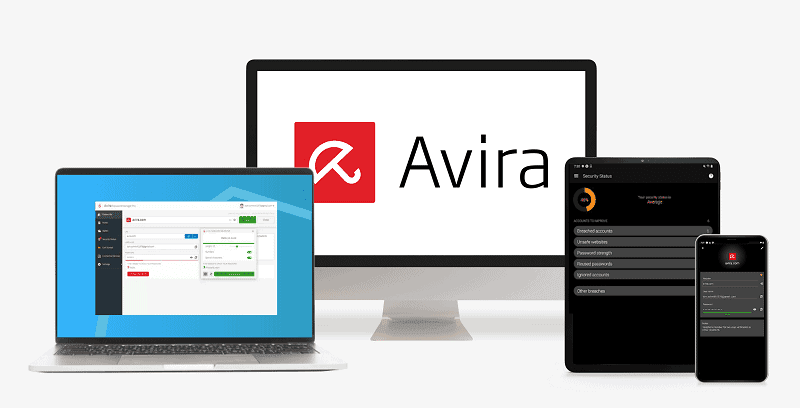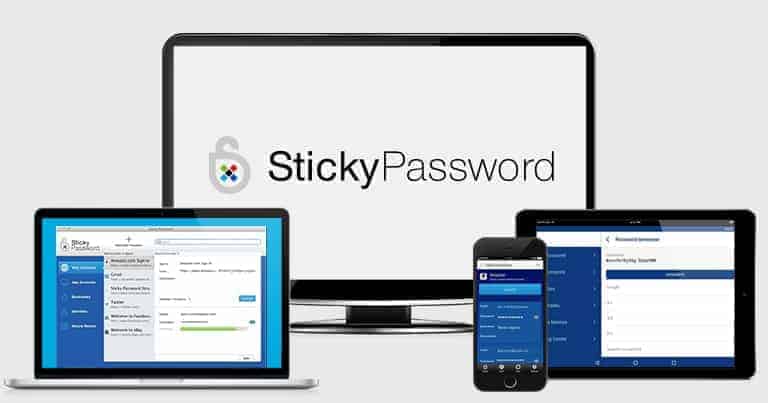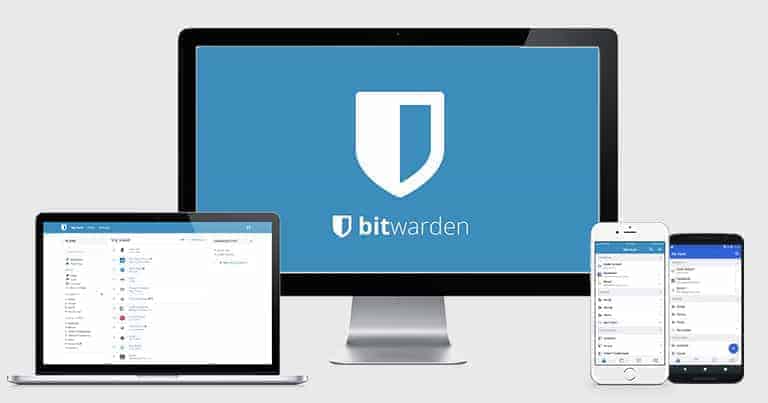
Updated on: February 10, 2026
- 🥇 RoboForm : Combines strong 256-bit AES encryption, zero-knowledge security, Touch ID support, and seamless syncing across macOS, iOS, and browsers with the most accurate form-filling tool on Mac. It reliably auto-fills complex address, banking, and registration forms, offers a dedicated Mac app and Safari extension, and remains one of the most affordable password managers with a free plan and 30-day money-back guarantee.
I tested the top password managers on the market to find the best ones for macOS in 2026. I evaluated security, usability, features, and value for Mac users.
Apple’s iCloud Keychain and Passwords are decent free options but lack advanced tools found in top password managers, and their cross-platform compatibility is limited. They’re also less secure, mainly because, unless you use Touch ID, they require your Mac password instead of a separate master password to log into your vault.
The password managers on this list provide big improvements over iCloud Keychain and Passwords, thanks to additional tools and features, advanced sharing and vault-organization options, and the ability to store much more than passwords. My #1 pick (RoboForm) stands out on macOS with its dedicated Mac app, Safari extension, Touch ID support, and industry-leading form-filling engine that can accurately auto-fill.
Quick Summary of the Best Password Managers for Mac
🥇1. RoboForm — Top Password Manager for Mac With Excellent Form-Filling
RoboForm has the best form-filling functionality of any Mac password manager I tested. While most macOS password managers can handle basic address and payment fields, RoboForm offers built-in identity templates for things like passports, vehicle registration, and business details, plus custom templates for anything else. In my testing on macOS using Safari and Chrome, RoboForm accurately auto-filled intricate tax forms and visa applications in seconds without missing a field.
RoboForm also includes:
- Two-factor authentication (integrated authenticator).
- Passkey support.
- Secure password and note sharing.
- Password vault auditing.
- Secure bookmarks storage.
- Emergency access.

RoboForm’s secure bookmark storage works exceptionally well on macOS, especially if you switch between Safari and other browsers like Chrome or Firefox. Using the RoboForm Mac app and Safari extension, you can save, organize, and sync bookmarks across all your Apple devices, keeping your web shortcuts consistent on your MacBook, iMac, iPhone, and iPad.
Unlike standard browser bookmarks, RoboForm’s bookmarks are stored encrypted in your vault, can be placed into folders, and can be securely shared with other RoboForm users when needed. This makes it easy to manage work resources, admin portals, and frequently used sites from your Mac without relying on browser-specific syncing.
One of my favorite RoboForm features is its built-in authenticator that works seamlessly on macOS. It allows you to generate and auto-fill one-time 2FA codes directly from the RoboForm Mac app and Safari extension. Once enabled, RoboForm automatically fills both your login credentials and TOTP codes, removing the need to switch to separate apps like Google Authenticator. I found this one-click login experience especially convenient on macOS, where it integrates smoothly with the system and supports Touch ID for secure access to your vault.
RoboForm has a dedicated macOS app that provides full access to your vault, identities, secure notes, bookmarks, and sharing settings without relying on a browser. The app is lightweight, fast, and integrates tightly with the RoboForm Safari extension, allowing you to manage and organize your data centrally while still enjoying seamless auto-fill in Safari and other Mac browsers.
This password manager is one of the most affordable and offers several premium plans and a free one. RoboForm Free includes unlimited password storage on one device, built-in 2FA support, advanced form filling, password auditing, secure notes, and encrypted bookmark storage. RoboForm Premium adds sync across unlimited devices, Touch ID support on compatible Macs, secure password and item sharing, emergency access, and cloud backup for all your data. RoboForm Family includes the same features for up to 5 users, making it easy to share passwords securely across multiple Macs in a household. All paid plans are backed by a 30-day money-back guarantee.
Bottom Line:
RoboForm is an excellent choice for Mac users, especially those who frequently fill out complex online forms, thanks to its advanced form-filling templates for passports, tax documents, and business forms. Its secure bookmark storage keeps web shortcuts encrypted and accessible across all your Apple devices, while full macOS app support and Safari extension integration make managing passwords, identities, and secure notes effortless. Paid plans include multi-device syncing, Touch ID access, and emergency sharing, all backed by a money-back guarantee for risk-free testing.
Read the full RoboForm review >
🥈2. 1Password — Very Secure With Great Features for Mac
1Password provides an ideal balance of security and convenience for Mac users with industry-standard 256-bit AES encryption, zero-knowledge architecture, and two-factor authentication (2FA). Its Mac app and Safari extension are intuitive, with a clean, polished design that feels native to macOS. It supports Touch ID for quick vault access and syncs seamlessly across macOS devices. Also, 1Password regularly undergoes third-party audits to ensure it securely manages your data.
During my tests, I found it very simple to use 1Password. I could easily import my saved passwords from iCloud Keychain, access all the provided features, auto-save and auto-fill login credentials, credit cards, and even addresses. I could also share credentials with anyone I wanted. With iCloud Keychain, you can only share passwords with other Apple users. If you have a newer Mac with Passwords installed on it, your contacts have to have newer Macs and iPhones for you to be able to exchange passwords.
In addition to standard features, 1Password also has:
- Vault auditing & breach monitoring (Watchtower).
- Family vault sharing.
- Passkey authentication.
- Hidden vaults (Travel Mode).
- Built-in TOTP authenticator.
- Dark web monitoring.
- Email masking.
- Virtual cards (US only).
- Location-based logins.
- And more…

1Password’s password-sharing options are great, especially if you opt for the family plan. Each member gets a Private vault and access to a Shared vault for items like Wi-Fi or streaming logins. You can also create additional vaults to share specific information with select family members, like sharing financial details only with a partner. Family organizers manage access and can recover accounts if someone forgets their password. Additionally, guest accounts allow you to share limited information securely with non-family members, such as babysitters or house guests, without giving them full access to your vault.
Available to US users, 1Password’s Privacy Cards allow you to create virtual payment cards for safer online transactions. These virtual cards help protect your real credit or debit card details by generating unique card numbers for each merchant. You can set spending limits, create single-use cards, or lock cards to specific merchants, reducing the risk of fraud or misuse if the card details are exposed in a data breach. Privacy Cards can be managed directly within 1Password’s browser extension, which I found very convenient.
1Password’s location-tagging feature is cool, too. It lets you tie any vault item, like passwords or notes, to a physical address, so it shows up automatically in the mobile app’s “Nearby” section when you’re close. You set it up by editing an item, adding a location via address or map, and fine-tuning the proximity range (50 feet to 10 miles). It all happens locally on your device for privacy. I tested it by linking my local coffee shop’s Wi-Fi password to its address. When I arrived and opened my MacBook, the code was waiting in “Nearby” — no searching needed.
1Password Individual ($2.99 / month) is 1Password’s single-user plan, while 1Password Families ($4.49 / month) covers 5 users, with the option to add more users for an additional fee. It adds shared vaults, permission management, and account recovery options between family members. 1Password is the only password manager on this list that doesn’t limit the number of users who can share a family plan. 1Password has a 14-day free trial, but there’s no money-back guarantee.
Bottom Line:
1Password is the best password manager for macOS. It provides advanced security features, a user-friendly interface, and low-cost plans for individual users and families. It has a lot of useful tools, but my favorites are its family-oriented features such as advanced sharing options and family vaults. 1Password doesn’t offer a money-back guarantee, but both 1Password Individual and 1Password Families are available with a 14-day free trial.
Read the full 1Password review >
🥉3. Dashlane — Intuitive With Advanced Extra Features
Dashlane offers a robust set of features for Mac users that go far beyond what Apple’s iCloud Keychain and Passwords provide. In addition to standard password management tools, it includes an integrated VPN for secure browsing on macOS, advanced anti-phishing protection, dark web monitoring, and password health reports. These extras make it a strong choice for Mac users who want both security and convenience without juggling multiple apps.
The browser-based Dashlane app integrates seamlessly with Safari, Chrome, and Firefox on Mac, enabling easy auto-fill of passwords (though RoboForm takes the lead in this), payment details, and personal information. It also supports Touch ID and Face ID logins on compatible Macs, so you can unlock your vault quickly and securely without entering a master password every time. Coupled with a clean Mac interface and cross-platform syncing, Dashlane provides a smooth and secure workflow for managing passwords, notes, and digital identities on macOS.

Beyond essentials like 2FA, passkey authentication, and dark web monitoring, it’s the only standalone password manager to include a VPN, and it’s as fast and secure as some standalone VPNs. It’s provided by Hotspot Shield, one of the most popular VPN providers on the market. Avira is the only other brand on this list with a VPN, but only as part of its full internet security suite.
I really like Dashlane’s dark web monitoring, which goes beyond most competitors by using data hosted on its own servers — other password managers tend to use external databases to scan for leaks. Its anti-phishing protection is very impressive, too. While most password managers block auto-fill on mismatched URLs, Dashlane adds real-time warnings if you manually enter credentials on unrecognized or fake sites — including spoofed Dashlane pages.
Dashlane Premium allows unlimited passwords across unlimited devices and includes all of Dashlane’s features, including the VPN and phishing protection. While this plan is a bit pricier than some competitors, with our exclusive discount, you can get it for just $4.99 / month. Dashlane Friends & Family includes 10 licenses and a family management dashboard for $7.49 / month, but the family admin is the only one with access to the VPN. Dashlane has a 14-day free trial and a 30-day money-back guarantee.
Bottom Line:
Dashlane has an intuitive interface with many features. It combines 2FA, password sharing, password vault auditing, and more, alongside standout features like a VPN, live dark web monitoring, and phishing protection. Dashlane offers a 14-day free trial of some of Dashlane’s premium features (not including VPN), and all of Dashlane’s paid plans have a 30-day money-back guarantee.
Read the full Dashlane review >
4. Proton Pass — Privacy-Focused Mac App With Unique Features
Proton Pass is a great choice for Mac users who value security and privacy. Built by the team behind Proton Mail, it delivers excellent encryption standards and some unique tools you won’t find in many other password managers. It uses AES-256-GCM end-to-end encryption to secure not only your passwords but also metadata, such as usernames and email addresses. Many password managers don’t encrypt this extra data, which makes Proton Pass a stronger choice for privacy.
Additional features include:
- Email aliasing (with custom domains).
- Secure notes storage.
- Vault sharing with other users.
- Encrypted storage (10 GB for Pass, 50 GB for Family).
- Cross-platform syncing.
Proton Pass’s email aliasing is one of its most innovative tools. It lets you generate disposable email addresses when signing up for services, protecting your real inbox from spam and phishing attempts. If a masked address ever becomes compromised, you can simply disable or delete it without exposing your primary email. You can create an unlimited number of aliases and even use custom domains, but what I liked most is that you can also reply from an alias. Competitors like 1Password and NordPass also offer email aliases or masking, but Proton’s execution of this feature is the best by far.

I also liked how Proton Pass includes generous encrypted storage — 10 GB on the individual plan and 50 GB with the Family plan — which makes it easy to keep sensitive documents safe alongside your logins. Secure notes are another highlight, giving you a protected space for recovery codes, Wi-Fi credentials, or other personal details.
Vault sharing is simple to set up and worked seamlessly in my tests. This makes it practical for securely sharing streaming service logins or work accounts with family members or colleagues. Proton Pass’s smooth auto-fill and clean Mac interface make the whole experience fast and frustration-free. You can create up to 50 vaults, and you can share 10 of them with up to 10 people.
Proton Pass Plus starts at $2.49 / year and offers advanced features like unlimited aliases, up to 50 vaults, and dark web monitoring. Families can choose Proton Pass Family for $4.99 / year, which covers up to 6 users and significantly increases encrypted storage. All plans are also backed by a 30-day money-back guarantee.
Bottom Line:
Proton Pass is an excellent option for Mac users who want more than just basic password storage. With strong end-to-end encryption, reliable auto-fill, and privacy-first tools like email aliasing and secure notes, it delivers a smooth and secure experience. The addition of generous encrypted storage and simple vault sharing makes it practical for both personal and family use.
Read the full Proton Pass review >
5. NordPass — User-Friendly Mac App With Excellent Security
NordPass is one of the most user-friendly password managers for Mac. It lacks advanced features that competitors like Dashlane include, but it’s a great choice if you’re a Mac user looking for a more streamlined password manager.
NordPass has excellent security — it uses XChaCha20 encryption instead of 256-bit AES. While XChaCha20 isn’t inherently stronger (neither standard has been hacked), I like that XChaCha20 is more modern.
Additional features include:
- Password sharing between users.
- Password vault auditing.
- Data breach scanning.
- Email masking.
- Passkeys.
NordPass’s Email Masking feature allows you to create unique, alternative email addresses to protect your primary email from spam, phishing attacks, and data breaches. These masked emails can be used when signing up for online services, shopping, or subscribing to newsletters. Emails sent to a masked address are forwarded to your actual inbox, with the option to disable or delete the mask at any time. Unfortunately, NordPass doesn’t offer the ability to respond from an email mask, unlike Proton Pass.
The data breach scanner is great. Monitoring starts when you add an entry to your vault, auto-scanning leaked databases to flag breaches. I love how it preloads your account’s digital footprint — detecting frequently used emails and more. Breach reports detail any leaks and offer clear, actionable steps like updating passwords or checking bank activity.
I also like how NordPass includes password auditing — most of the competitors on this list have this, but NordPass’s auditing feature worked particularly well in my tests. What’s more, because NordPass is made by the team behind NordVPN (one of 2026’s top VPNs), I’m confident in its ability to keep your passwords secure and safe from vulnerabilities.

NordPass Free provides syncing across multiple devices, but you can only be logged into NordPass on 1 device at a time. NordPass Premium lets you access your password vault on an unlimited number of devices simultaneously for $1.43 / month, while NordPass Family adds up to 6 users (each user can have unlimited device connections at once) for $3.69 / month.
Bottom Line:
NordPass is a streamlined password manager for Mac. It comes with extra-strength encryption and useful features. NordPass does basic password management well, and its password sharing, vault auditing, and data breach monitoring features are well-built, too. NordPass Free is a decent free plan, and there’s a 30-day money-back guarantee on the NordPass Premium and Family plans.
Read the full NordPass review >
6. Keeper — High-Security Features (Including an Encrypted Messenger)
Keeper is one of the most secure password managers on the market, and it comes with a wide range of excellent features for Mac — including KeeperChat, an encrypted messaging app that ensures all the messages and media files you send and receive remain 100% secure and private.
KeeperChat impressed me with its ability to send encrypted messages and files. It also lets me create private groups, retract sent items, and set self-destruct timers. You can use it on your Mac, or any smartphone, tablet, or computer. Plus, it’s free for all personal users!
Keeper also offers tons of additional protections, including:
- Encrypted file storage (10–100 GB).
- Password vault auditing.
- TOTP, biometric, and USB 2FA compatibility.
- Passkey support.
- Emergency access.
- Secure password sharing.
I really like the level of customization Keeper provides when adding new entries to your vault. You can create detailed and personalized records for various types of information, including logins, payment cards, passports, software licenses, and more. Keeper offers pre-defined record types for many common categories, but it also allows users to customize each entry extensively with additional fields, notes, and even file attachments like photos or documents. In short, you can categorize your data in a way that makes sense for you.

Keeper’s Mac app is extremely easy to use, highly intuitive, and very functional. During my tests, all login fields were quickly identified and auto-filled, and it was easy to generate and store very strong passwords. The app also provides Touch ID compatibility for accessing your vault. Additionally, Keeper syncs across, iOS, Windows, Linux, and Android devices, so you have access to your credentials on any device other than your Mac.
Keeper Personal starts at $1.67 / month and includes unlimited passwords and devices, 2FA, password sharing, vault auditing, and emergency access. Keeper Family ($3.54 / month) includes up to 5 licenses and 10 GB cloud storage, and optional add-ons for both plans include dark web monitoring and up to 100 GB cloud storage. This isn’t bad, but Proton Pass includes 10 GB of storage for individuals and 50 GB for families at no additional cost. Keeper does have a free plan, but it’s only offered at the end of your free 30-day trial or when your subscription ends, and it has limited functionality.
Bottom Line:
Keeper is an extremely secure password manager with tons of useful features, including unique ones like an encrypted messaging app. It also has dark web monitoring and more cloud storage than any competitor. I appreciate how the password auditing makes it easy to see which of your passwords need updating, too. Keeper has several plans to choose from as well, and you can try out most of its features with a 30-day free trial.
7. Total Password — User-Friendly and Affordable
Total Password is a cost-effective and safe password manager that works well on Mac, offering strong security and an easy-to-use interface for managing your passwords and personal details.
Total Password lacks a dedicated Mac app, relying instead on browser extensions (Safari, Chrome, Edge). While not a big deal, I do prefer desktop apps on Mac — 1Password and RoboForm have native apps.
In addition to the “standard” features such as 2FA, password generator with password history, and data breach monitoring with security reports, Total Password comes with a really cool feature called Secure Me. It basically allows you to review the list of all devices where you’re logged in and remotely log out with just one click.

Another thing I like about Total Password is that its premium plan comes with TotalAV’s excellent ad blocker (you need to download it as a separate app).
While all of these features worked well in my tests, Total Password lacks dark web monitoring, passkey support, and password sharing. However, it handles the essential password management tasks well, and I do like the Secure Me feature.
The Total Password browser extensions and mobile apps are simple and intuitive, too. But, they have one drawback — transferring data from other password managers is difficult. This could be an issue if you’re thinking about switching password manager services (I never had any issues importing data from other password managers with 1Password).
There’s 1 dedicated Total Password plan, and it’s pretty good. It includes syncing across unlimited devices, password history, Total Adblock, security checks, and data breach alerts. It might not have all the features of some competitors, but it offers good value for money at $1.99 / month and comes with a 30-day money-back guarantee. You can also choose to get TotalAV Total Security for $49.00 / year, which includes TotalAV’s antivirus, the password manager, an unlimited-data VPN, an ad blocker, and more.
Bottom line:
Overall, Total Password is a dependable password manager, particularly for those looking for a budget-friendly choice with important security features or those looking to bundle their password manager with a good antivirus. Plus, it offers a 30-day money-back guarantee, so you can try it out risk-free to see if it meets your needs.
Read the full Total Password review
8. Avira Password Manager — Highly Secure With a Streamlined Interface
Avira is a basic but highly secure and easy-to-use password manager that works perfectly with macOS. There are no desktop apps; instead, everything is done via a web dashboard, and the browser extensions give additional functionality.
There are browser extensions for Safari, Chrome, Firefox, Opera, and Edge. Unfortunately, I couldn’t log into the Safari extension in my tests, but I didn’t have any issues logging into the extensions for the other web browsers. As soon as I did, the auto-fill and auto-save functions worked perfectly — automatically offering to save my credentials each time I created a new account and filling out my login credentials for all saved accounts.
Avira Password Manager’s other features include:
- Unlimited password storage across multiple devices.
- Account breach alerts.
- Website security checks.
- Password audit tools.
- 2FA (two-factor authentication) and biometric logins.
- Built-in 2FA authenticator.

I like Avira’s web app — it’s intuitive, letting you organize your vault neatly. However, it lacks password sharing, emergency access, encrypted storage, account recovery, and other features that are offered by competitors such as RoboForm. Still, its focus on simplicity and security suits non-technical Mac users well.
Avira’s free password manager is also pretty decent. It offers unlimited password storage across unlimited devices. Proton Pass and Bitwarden is the only other free password manager that allows unlimited devices on its free plan. However, you will need to upgrade to Avira Pro ($2.66 / month) if you want access to the more advanced features of password auditing, data breach monitoring, and website security checks. There is no family plan.
Avira’s password manager is also available as part of Avira’s full internet security suite, Avira Prime ($59.99 / year), which includes Avira’s antivirus suite and VPN in addition to the Pro version of the password manager. Avira offers a generous 60-day money-back guarantee on all paid plans.
Bottom Line:
Avira Password Manager is a high-performing and secure option that works well across all devices. While it lacks some features that its competitors have, its 2FA, breach monitoring, and password auditing are all good. It also offers a solid free version and reasonably priced paid plans.
Read the full Avira Password Manager review >
9. Sticky Password — Best Local Password Storage Option
Sticky Password provides a decent range of security tools for macOS — including the option to only synchronize data via trusted networks, such as your home Wi-Fi network, and store your passwords locally. There is also a cloud sync option for users who want to sync data between devices from any location.
Sticky Password is a good option for anyone who wants more control over how their sensitive data is stored, but it doesn’t include as many features as top competitors like 1Password or Dashlane. That said, it does offer basic password manager features, dark web monitoring, and a cool feature called Contactless Connect.
Contactless Connect lets you securely log into websites on any computer without installing Sticky Password by scanning a QR code with your mobile app to transfer credentials, leaving no trace after use. It’s ideal for shared or travel devices, ensuring your passwords stay safe and accessible, even on restricted systems like work PCs or Chromebooks.

Overall, Sticky Password has a good range of features. Sticky Password Free includes unlimited password storage, secure notes, a password generator, credit card auto-fill, and 2FA — but only for 1 device. Priced at $29.99 / month, Sticky Password Premium adds local Wi-Fi sync, cloud sync and backup, secure password sharing, emergency access, and priority support — all across multiple devices. Plus, 10% of every purchase of Sticky Password goes to the Save the Manatee Club! Sticky Password has both a free trial and a 30-day money-back guarantee. There’s also an option for a Premium lifetime plan.
Bottom Line:
Sticky Password has a good range of password management features, including a local data storage option. I like Sticky Password’s password sharing, bookmarks storage, and easy credit card auto-fill — plus 10% of every Sticky Password purchase benefits the Save the Manatee Club. Sticky Password’s free version includes a 30-day free trial of Sticky Password Premium, and there’s also a 30-day money-back guarantee.
Read the full Sticky Password review >
10. Password Boss — Good Range of Password Management Features
Password Boss provides a decent product for Macs — it’s not the best, but it’s secure, and it handles all of the basics well. Plus, Password Boss comes with a pretty good range of additional tools, including features like remote data deletion.
Password Boss also includes:
- Password and note sharing.
- Emergency access.
- Dark web scanning.
- Local data storage (online backups for premium members).
- 2FA.
- Password health monitor.

Password Boss isn’t one of the most feature-rich password managers available, but all of its tools worked well during testing. Its auto-fill isn’t as good as others, particularly RoboForm, but it still did a good enough job.
The premium plan includes all of the above features for just $2.50 / month. There’s also a free plan, but it isn’t the best — it’s only available on 1 device and is very limited. You can try Password Boss with a 30-day free trial, and there’s a 30-day money-back guarantee.
Bottom Line:
Password Boss offers secure password storage and a decent array of security features. All of Password Boss’s features are well-made, but there are other products on this list that provide more features for a similar price. Password Boss offers a 30-day money-back guarantee and a free 30-day trial of its premium plan as part of its free plan, so you can try it out risk-free.
Read the full Password Boss review >
Bonus. Enpass — Offline Password Manager for Advanced Users
Enpass is an offline-first password manager that encrypts and stores all data locally on your Mac. You can opt to back up to USB or sync via third-party cloud services (iCloud, Dropbox, Google Drive) for cross-device access.
Here’s what Enpass includes:
- Unlimited password storage across multiple vaults.
- Password sharing.
- Passkey support.
- Password vault auditing.
- Data breach alerts.
- Biometric logins.
- TOTP code generator.

Enpass doesn’t offer traditional 2FA (like authenticator apps) for vault access but supports an optional Keyfile as a second security layer alongside your master password. While its offline design maximizes security, it sacrifices the auto-syncing of 1Password or Dashlane. Still, for Mac users prioritizing local control, Enpass is a decent option.
Enpass’s free desktop app for Mac includes most core features, like unlimited password storage, vault auditing, and TOTP support, but premium plans add data breach monitoring, full mobile app access, and more. If you want to access these features or to use Enpass on your mobile device you’ll have to get one of the paid plans, which start at $0.79 / month. There’s also a family plan for up to 6 users, which costs $2.39 / month, and an incredible one-time purchase offer for just $79.99 — a similar price to many competitors’ annual plans.
Bottom Line:
Enpass is a highly secure, fully offline password manager — it doesn’t have as many features as some of its competitors and lacks the convenience of automatic syncing across devices, but its basic password management functions work well. Enpass for Mac is free, but you’ll need to upgrade to a paid plan to use the mobile apps and to get data breach alerts.
Bonus. Bitwarden — Best Open-Source Password Manager
Bitwarden delivers solid password management at a low cost, though it’s slightly less intuitive than rivals like 1Password. It offers a clean and functional Mac app, is completely open-source, and allows self-hosting so it’ll appeal to tech-savvy users. In my tests, it auto-filled logins smoothly via Safari and Chrome extensions.
Bitwarden includes:
- Password security auditing.
- Local or cloud-based data sync.
- Passkey support.
- 1 GB encrypted storage.
- Emergency access.
- Password generator.
- Password sharing.
- 2FA (two-factor authentication).
- TOTP authenticator.

Like 1Password, Bitwarden’s email alias feature relies on third-party providers such as Fastmail, but Bitwarden has additional free options via DuckDuckGo and SimpleLogin. You need an account with one, and I found setup trickier than NordPass’s 1-click masking. Still, it’s a handy way to shield your real email from spammers.
Bitwarden Free offers generous unlimited password storage across unlimited devices. However, to access most of the other features — including password security auditing, emergency access, and encrypted storage — you’ll need to upgrade to Bitwarden Premium for $1.00 / month. Bitwarden Families ($3.33 / month) covers up to 6 users and offers password sharing.
Bottom Line:
Bitwarden is secure and affordable, but it’s not as easy to use as the other products on this list. Bitwarden has a pretty good free version — it provides unlimited storage, but you can also sync it across all of your devices. Bitwarden Premium and Families add the full range of other features and are both available with a 30-day money-back guarantee.
Read the full Bitwarden review >
Quick Comparison Table
Testing Methodology: Comparison & Ranking Criteria
To rate these password managers for Mac and ensure they offer top-tier protection, I employed our rigorous testing methodology that involved real-life testing scenarios. Here are the specifics:
- I assessed each password manager’s security measures. I looked for password managers that offer robust encryption (AES 256-bit or comparable), adhere to zero-knowledge policies, and are compatible with 2FA methods such as biometric scanning, TOTP (temporary one-time password) generators, or USB tokens.
- I compared products to Apple’s built-in password managers. Although I’m not a fan of iCloud Keychain and Passwords (more on that later), they do make password management easy. That’s why I made sure all the password managers on this list make it quick and easy to manage passwords, integrate well with Apple-related apps like Safari, have far better cross-platform compatibility and many more features, making the switch worth your while.

- I looked for good customization options and flexibility. A great password manager offers customization options, allowing you to tailor security settings and organize your data. For example, 1Password gives you the option to have multiple vaults and Sticky Password lets you choose between storing your data online or offline. Bitwarden even offers CLI tweaks for tech-savvy Mac users, a perk closed-sourced tools rarely match.
- I evaluated the overall value provided by each password manager. Some password managers are much cheaper than others, but I took into account all their features and functionality to ensure you get the best value for your money (RoboForm came out on top). I also considered free trials and money-back guarantees, so you can make sure you’re satisfied before committing to anything long-term. All my top picks offer money-back guarantees, so you can try them out risk-free.

- I picked password managers that are updated regularly. I chose password managers that prioritize security through regular updates and independent audits. This ensures strong defense against emerging threats and maintains the integrity of your data.
- I chose password managers with good customer support. These resources are invaluable for troubleshooting and leveraging the full potential of your password manager. Dashlane, for example, provides a deep knowledge base, live chat, email support, and Reddit support.
macOS’s Built-In Password Managers vs. Third-Party Password Managers
Apple products all come with a free built-in password manager called iCloud Keychain. Newer Macs also come with a dedicated app for managing your credentials called Passwords (available from macOS Sequoia). These solutions are automatically built into macOS and iOS and linked to your Apple ID, and they come with basic features such as password generation, auto-fill, and auto-save, and secure end-to-end encryption, as well as password auditing and sharing and the ability to save some other items beyond passwords (verification codes, passkeys, etc).
iCloud Keychain and Passwords aren’t bad — they’re secure, convenient, and work well. However, even Passwords, which is an improvement over iCloud Keychain, is relatively basic and lacks a lot of features you can get with third-party managers:
- Limited cross-platform compatibility. There’s no Android or Linux app, and the Windows one is difficult to set up. Moreover, there’s no extension for Firefox.
- Password sharing is limited to other Apple users. For Passwords, your contacts would have to have macOS 14 or later or iOS 17 or later, unlike 1Password’s flexible family sharing across platforms.
- Lack of flexibility. You can store items other than passwords, but the range of those items doesn’t come close to third-party apps such as 1Password, RoboForm, or Keeper. The password generator only has one customization option — to exclude special characters. And you can’t really organize your vault in any other way than sorting all the passwords in a descending/ascending order based on their title or the day they were added/modified. There are no tags or multiple vaults.
- Lack of extras. If you opt for a third-party password manager, you can pick based on the extras you need. Advanced form-filling? RoboForm is ideal for you. 100 GB of encrypted storage? Look no further than Keeper. Virtual payment cards? 1Password is the solution. With Apple’s Passwords, on the other hand, you only get data breach monitoring.

These aren’t the only disadvantages of iCloud Keychain and Passwords. Since iCloud Keychain is deeply integrated into the Apple ecosystem, all your sensitive data — passwords, credit card information, and other personal details — are stored within Apple’s infrastructure. Relying solely on one platform for both device access and password management increases vulnerability in case of a breach.
Another drawback is that Apple’s system is closed-source, meaning that external security experts cannot review or audit the underlying code to ensure there are no hidden vulnerabilities or backdoors. This means you have to trust Apple entirely, without the ability to verify its security measures through community scrutiny.
In contrast, the best third-party password managers for macOS don’t suffer from these disadvantages. They each have their strong points and unique features, and are quite affordable or even entirely free.
What Is the Best Password Manager for Safari?
The best password manager for Safari is RoboForm. It combines top-tier security with an intuitive and easy-to-use Safari extension, letting you set up the app and import all your passwords from iCloud Keychain or other password managers in minutes.
RoboForm makes auto-filling in Safari seamless. It doesn’t just handle passwords — you can auto-fill addresses, credit card details, and even complex forms like tax documents, passports, and business forms directly from your vault. All your data is protected with 256-bit AES encryption, zero-knowledge architecture, and two-factor authentication (2FA), keeping your sensitive information secure.
On Mac, RoboForm is compatible with Touch ID, so you can unlock the app and the Safari extension quickly and securely with your fingerprint. Its integrated authenticator also lets you auto-fill TOTP codes for sites that require two-factor authentication, streamlining logins on your Mac.
RoboForm also offers secure bookmark storage, which is synced across devices and accessible directly from Safari. This makes it easy to manage and share important links without relying on browser-specific syncing tools.
While it’s highly affordable, RoboForm doesn’t compromise on features. Its advanced form-filling, cross-platform syncing, and secure sharing make it one of the best options for Mac users who rely on Safari for work or personal browsing.
That said, other password managers like Dashlane and 1Password also offer good integration with Safari. But RoboForm’s convenience, form-filling, security, and overall value make it stand out as the best for Safari.
How Do Passkeys Work on Mac?
Passkeys on Mac, introduced with macOS Ventura, are a more secure alternative to traditional passwords.
When setting up an account with a passkey, a pair of cryptographic keys is generated: a public key stored on the server and a private key kept on your Mac and synced across your devices via iCloud. Logging in then simply requires authentication through Touch ID on your Mac or Face ID on an iPhone or iPad.
During login, the system pairs the iCloud-synced private key on your Mac with the server’s public key. Touch ID or Face ID authentication verifies your identity securely — no traditional password is needed.
Third-party managers like RoboForm and 1Password enhance passkey support, extending compatibility beyond Apple’s ecosystem. They simplify cross-platform logins and add perks like advanced 2FA and secure sharing, making passkey management smoother and safer across different ecosystems.
Top Brands That Didn’t Make the Cut
- LastPass: LastPass was once among our top choices for Mac users, but due to major data breaches in recent years, it has compromised user trust, and we can no longer recommend it.
- KeePass: KeePass is very secure and has lots of great features. However, its steep learning curve, unattractive user interface, and slow customer support make it too user-unfriendly to be featured on this list.
- True Key: I was expecting a lot more from True Key (a McAfee brand). However, it was so buggy during my tests that I uninstalled it after struggling with it for just a few minutes.
- Zoho Vault. Zoho Vault is a decent password manager, but it was created for business use, so it’s not the best option for home users.
Frequently Asked Questions
What’s the best password manager for Mac users?
As per my testing, the overall best Mac password manager is RoboForm. It has a native macOS app, no-error form-filling, and works with Safari. Plus, it’s very affordable and even offers a free plan. Dashlane and 1Password are great options, too. They come with some extra features like Travel Mode (1Password) and VPN (Dashlane).
What are the risks of using Apple’s built-in password manager for all my data?
Apple’s built-in password manager, Passwords, only uses Face ID, Touch ID, or your Mac password to unlock its vault. If your Mac password is weak or shared, you risk having your data compromised.
Plus, since Apple’s password manager is closed-source, there could be potential vulnerabilities that have not yet been discovered — since no one from the community can review its code, you basically just have to hope that Apple’s developers will find any bugs before malicious actors do.
How do password managers protect against phishing attacks on Mac?
Password managers combat phishing on Mac in the same way they do on other devices: by securely storing website URLs along with your login details. When you auto-fill credentials, the manager checks the website’s URL against the stored one. If there’s a mismatch, suggesting a phishing attempt, the manager won’t auto-fill the login information, preventing you from inadvertently entering your credentials on a malicious site. Dashlane enhances this phishing protection by actively sending alerts when you attempt to manually enter credentials on a potentially dangerous site.
Can a password manager auto-fill passwords in all browsers on Mac?
Most password managers are designed to work across various browsers on Mac, including Safari, Chrome, Firefox, and others. They come with browser extensions that enable auto-fill functionality, ensuring you can use them regardless of your browser choice. However, compatibility may vary slightly between different password managers, so it’s worth checking the specifics for the one you choose, especially if you use a less popular browser. That said, all of the password managers on this list worked with the majority of browsers on Mac.
Do I need to pay for a password manager?
While there are decent free password managers, most of them lack important features, such as multi-device sync, password sharing, dark web monitoring, emergency access, and 2FA. But if you’re only in the market for a free password manager, you can check out our recommendations here.
However, if you’re looking for premium protection, an intuitive user interface, and advanced security features, you’re going to have to spend some money. My favorite Mac password manager is RoboForm — it uses advanced encryption, has a Mac app and a Safari extension, and comes with a money-back guarantee.
Does Mac have a built-in password manager?
Yes, iCloud Keychain and Passwords are Mac’s built-in password managers. They come as standard on all Apple products (Passwords only on macOS Sequoia) and sync seamlessly between macOS and iOS. However, they’re missing a lot of the more advanced functionality and features that other third-party password managers tend to include as standard. So while they’re not a bad option — particularly as they’re free — iCloud Keychain and Passwords are not as good as standalone password managers.
Is there a free password manager for Mac?
Yes — most of the password managers on this list offer a free plan, and they are all compatible with macOS. However, the free plans offered by standalone password managers are usually quite limited — with caps on the number of passwords you can store, limited device syncing, and fewer features than their paid plans.
Apple also has a built-in password manager, called iCloud Keychain — or Passwords on macOS Sequoia — which is free. However, it’s only fully compatible with Apple products and has far more basic features than most standalone password managers. Ultimately, if you want a secure, easy-to-use, and feature-rich password manager, I’d recommend paying for a premium product.
